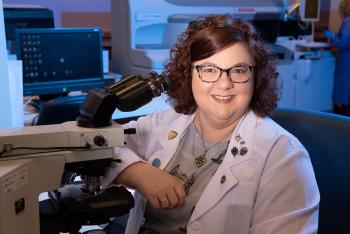Inspira Health is featured in a national colorectal cancer care report issued by Fight Colorectal...
Read More

Since the 1990s, colorectal cancer rates have been rising steadily among adults ages 21 to 49 and decreasing among older adults. What’s behind this surprising trend, and how do you know if you’re at risk? Understanding colorectal cancer and its risk factors can help you take preventive steps against it.
Colorectal cancer is the uncontrolled growth of cells in the rectum or colon. “Most of the time, colorectal cancer starts as an irregular growth on the colon or rectum’s inner lining,” said Peter J. Senatore, Jr., M.D., director of the Rectal Cancer Program at Inspira Health. “These irregular growths, or polyps, may not be harmful themselves, but they have the potential to mutate into cancer over time.”
If colorectal cancer forms from a polyp, it can grow into the colon or rectum wall, eventually spreading to other areas of the body, including blood vessels, lymph vessels and lymph nodes. When colorectal cancer is detected early on, it is more easily cured and more treatment options are available.
Although colorectal cancer usually does not cause symptoms in its early stages, they can develop and become more prominent as the disease progresses. Common symptoms may include changes in bowel habits that last longer than a few days, blood in the stool, inability to empty your bowels, fatigue, abdominal pain and unexplained weight loss.
It’s not entirely clear why colorectal cancer rates are spiking in younger adults. However, evidence suggests that environmental and lifestyle factors, including obesity, poor diet, smoking and lack of exercise, may have a role.
“An increasing amount of evidence also links gut bacteria and inflammation to early-onset cases of colorectal cancer,” said Dr. Senatore. “Everything we eat, drink and breathe affects our gut microbiome, and factors such as diet and exercise can affect the quantity and quality of bacteria in our guts.”
An unhealthy diet and poor gut health can lead to inflammation, the body’s response to disease and injury. Inflammation has the potential to block cancer-fighting cells and cause mutations, creating an environment conducive to cancer.
Although some risk factors for colorectal cancer like age and family history can’t be avoided, there are steps you can take to decrease your risk.
“When colorectal cancer is detected early on, it’s very treatable because the growth is smaller and it hasn’t spread to other parts of the body,” said Dr. Senatore. “Colorectal cancer can be entirely prevented or found early through the help of routine screenings.”
The American Cancer Society (ACS) recommends regular screenings for colorectal cancer starting at age 45 for those with average risk. People with a personal or family history of colorectal cancer, inflammatory bowel disease (IBD) or a hereditary colorectal cancer syndrome should talk to their doctor about getting screened earlier and/or more often.
You don’t have to wait until age 45 to get screened for colorectal cancer. Talk to your provider about the best screening options for you based on your family and personal history.
Inspira Health is a high reliability organization (HRO), which means safety is the top priority for patients and staff. To make an appointment, call 1-800-INSPIRA.

Inspira Health is featured in a national colorectal cancer care report issued by Fight Colorectal...
Read More
Inspira doctor shares how a balanced gut microbiome can be your ally in the prevention and early...
Read More
Colorectal cancer is expected to cause approximately 52,000 deaths this year. Here are the symptoms...
Read More
The material set forth in this site in no way seeks to diagnose or treat illness or to serve as a substitute for professional medical care. Please speak with your health care provider if you have a health concern or if you are considering adopting any exercise program or dietary guidelines. For permission to reprint any portion of this website or to be removed from a notification list, please contact us at (856) 537-6772